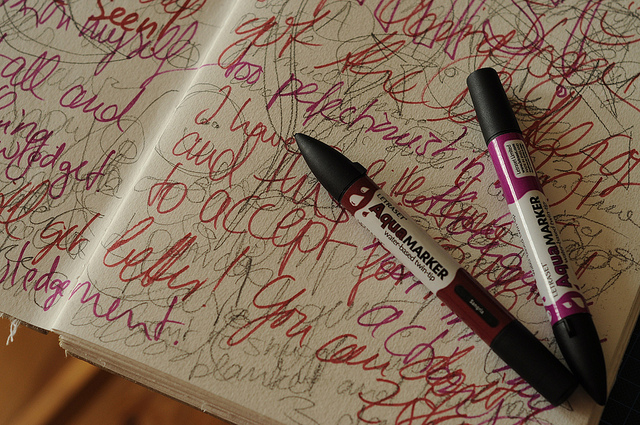In the last few days, I’ve been asked for advice on getting unstuck from a fairly broad range of circumstances, from money troubles and a living situation that’s not quite working, to issues with “friends” and one I can really relate to: turning to sugar when feeling down.
This reminds me that our lives are remarkably different, and yet so similar at the same time. Our problems have more in common than you might think at first—and, interestingly, so do the solutions.
Here are seven strategies for turning your angst into action:
- Write it down: Take a few minutes to put your experience, and how you feel about it, into words. That’s at least 75% of the battle—being able to honestly assess what’s happening around you and, more importantly, within you. The very process of writing it down (which is different than saying it aloud, by the way—the tangible output of pen on paper is a different kind of reflection, requiring a different level of thoughtfulness) gives clarity about some very important things: what you want for yourself and what you don’t; how you want to live and how you don’t; what you value and want to attract and what you don’t. And that knowing becomes your true north.
- Put it out there: Sunshine is the best disinfectant, no question. When I hold a worry inside, it festers; when I place it in the sunshine to dry out naturally, something magical happens. It gets lighter, more manageable. The weight of the burden is dispersed and possible solutions present themselves openly, in part because it’s no longer a secret. Share your problem or concern with someone: a friend, sibling, co-worker, clergy, therapist, spouse, etc. You’ll be amazed to find that you’re not alone, that someone else has usually been there and can tell tales from the front. This also helps make yourself accountable for taking some concrete steps to address the issue at hand.
- Decide what kind of life you want: One of the most frequent questions I hear is: “I want to change something in my life, but I don’t know what to do. How do I begin?” My answer might give you fits, because it’s going to sound too simple, but I swear it works. In order to change, you must decide. You must make up your mind right there, on the spot about how you want to live. You decide how it’s going to be. When I stopped drinking alcohol, I. Just. Decided. In one single moment. I decided that I didn’t want to live that way. And I was scared as hell. I cried even as I made that decision because I knew it was going to be hard and I didn’t want it to be hard and I didn’t want to fail. But my desire to change was stronger than my fear. And even though I’d never had much willpower in the past, somehow I held on to what little I did have and I watered it and gave it sunshine and it grew and grew and grew—and I learned that I’m way stronger than I thought.
- Focus on what you can control: One of the things I learned many years ago that completely changed my life is that I can’t control anything other people do, think, feel or say. The only thing I can control is how I respond to it. Will I react? Take the bait? Go down to their level? What words will I allow to come out of my mouth? Or, instead of responding, can I simply observe what’s happening, and try to understand what I feel about it and why, and then go about my day without getting sucked in by somebody else’s BS? Easier said than done, for sure, but absolutely possible and entirely worth it.
- Have courageous conversations: How many times a day do you bite your tongue? Someone says something rude or hurtful, and you let it go unchallenged. Undesirable behavior goes unacknowledged. Of course, I believe in picking my battles, but if we never stand up for ourselves, we become buried under the weight of what might have been. So learn, sooner than later, to get comfortable expressing your feelings and asking for what you need, in a way that’s courageous but not confrontational. It’s a skill that can be applied at home, at work, with friends…and it can bring you much closer to the life you really want.
- Get a therapist: I’ve sought therapy at several points of my life—and I’m in no way ashamed of it. Working with a therapist can be the best investment of time, money and emotional energy—if you get a good one. The process of opening up and the things you learn from connecting dots can absolutely change your life, or even save it. I’ve never felt more empowered than when working with a therapist.
- Make your own playbook: Even when circumstances look good on paper, they may not feel quite right. That’s when you know it’s time to make a change. That’s where manifesting comes in—the act of visualizing what you want and how you want to feel—and then making a plan to bring it into reality. So write that playbook. What are the five or ten things you need to do to get from where you are to where you want to be? In what order do they need to be done? What will you need to sacrifice? How long will it realistically take to get there? How will you keep yourself accountable along the way? More importantly, how will you keep yourself sane? It all starts with the playbook. It’ll help you remember that your current circumstances are bendable and won’t last forever…and give you some concrete direction for getting to the place you really desire.
~
Author: Becky Vollmer
Editor: Evan Yerburgh
Image: Flickr
~
Facebook is in talks with major corporate media about pulling their content into FB, leaving other sites to wither or pay up if we want to connect with you, our readers. Want to stay connected before the curtain drops? Sign up for our curated, quality newsletters below.







Read 0 comments and reply